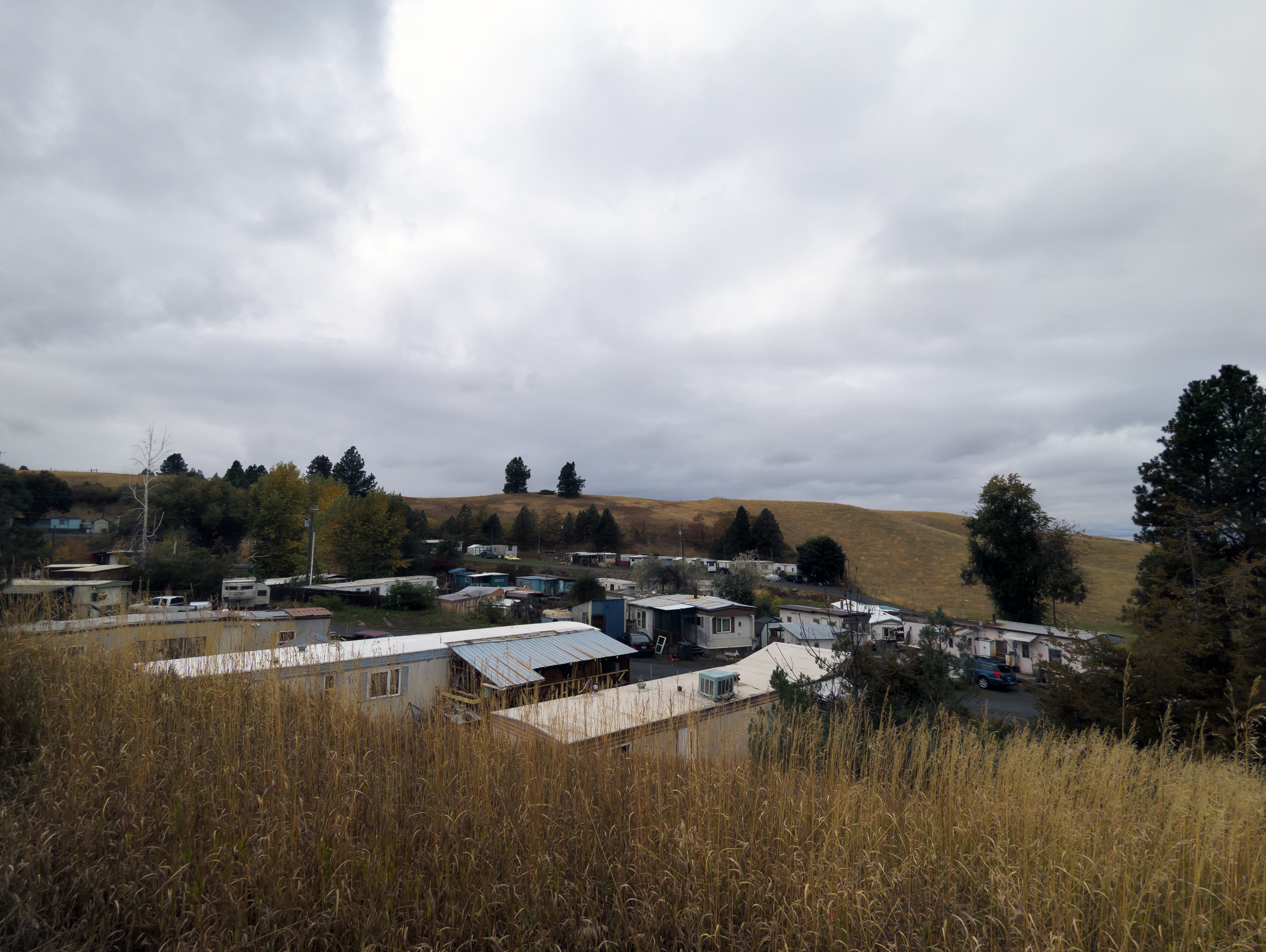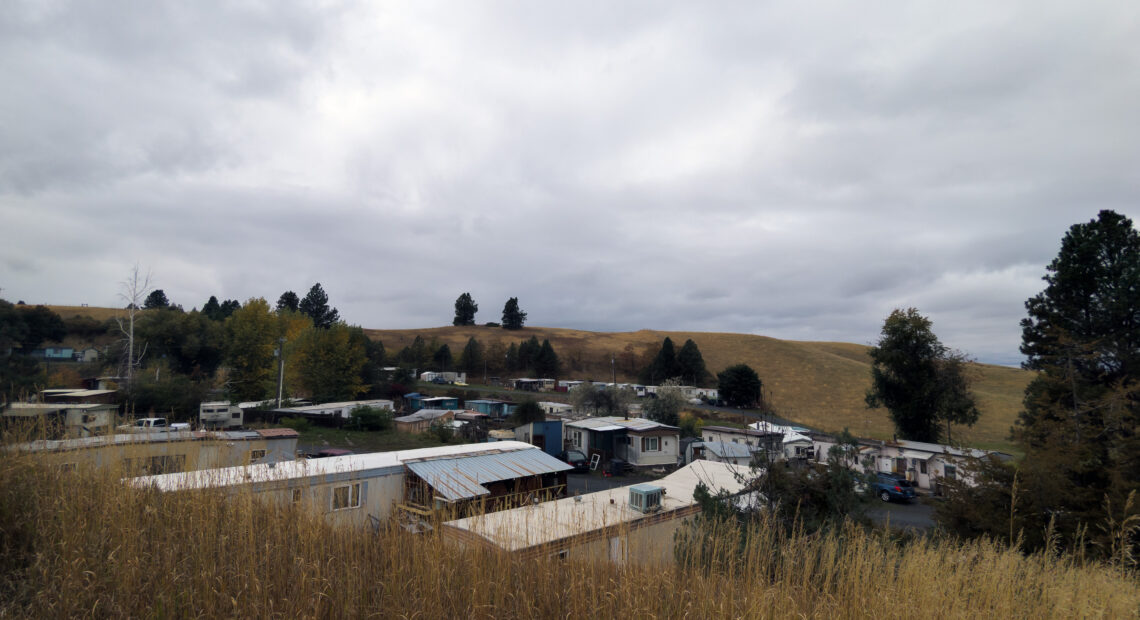
As housing crisis deepens, local author explores how trailer parks might be “last affordable option”
Listen
(Runtime 3:30)
Read
A decade ago, residents of Syringa Mobile Home Park in Latah County, Idaho found themselves without access to water.
Despite the pipes being turned on days later, testing showed high levels of bacteria and lead. The water wasn’t safe for drinking even after boiling. The people living in Syringa endured these conditions for more than three months.
The University of Idaho College of Law’s Legal Aid Clinic filed a class-action lawsuit in February 2014. It dragged on for seven years.
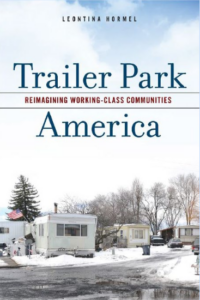
Trailer Park America: Re-imagining working class communities can be ordered online or at BookPeople in Moscow, Idaho.
“That was the only thing that started stopping or slowing down this idea that [the park owner] could just continue doing whatever they wanted, because they owned the land,” said Leontina Hormel, University of Idaho sociology professor and author of the new book “Trailer Park America: Reimagining Working Class Communities.”
The book focuses on the water crisis and eventual closure of Syringa Mobile Home Park. Residents had to find new places to live and many had to leave the area altogether.
“When we talk about housing, it’s not just about buildings but about relationships,” said Hormel.
There is a trend nationwide of mobile home parks being swallowed up by investment companies, Hormel said. Rents are increasing, forcing people out of communities that some have lived in for decades.
Crystal Riggs owns a single-wide trailer house in the Appaloosa Community mobile home park near Moscow, Idaho.
“I’ve lived here for 10 years now. We’ve gone through four [park] owners,” said Riggs.
Life has not been easy for Riggs. She said she was pregnant and married by 17. After couch surfing for years, she bought her own trailer, the first home she ever owned.
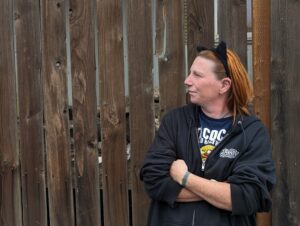
Riggs said the Appaloosa Community is full of people who know and understand each other. “I have their backs, and they have mine,” she said. (Credit: Lauren Paterson / NWPB)
“I finally had one person give me the chance,” said Riggs.
In most trailer parks, residents own the homes, but the land beneath them is leased. The new owners of Riggs’ park – Hurst & Sons LLC – want to raise the rent on Appaloosa residents from $350 per month to $500.
“There’s a lot of disabled people in here and the lease is all messed up,” said Riggs.
Raising the rent isn’t the only change at Appaloosa. A few rows over, resident Miriam Kent gives a tour of her yard where several big trees once stood.
“They took this huge cottonwood tree,” said Kent. “I didn’t know they were going to take this one. It was very upsetting.”
One of the first things the new owners did was remove trees all over the park.
“We had a baby owl die up there,” said Kent. She said a magpie’s nest was also lost when a third tree was cut down in her yard. “It’s like, unkindness.”
Another tree removed had a tire swing where the children of the park would play.
Upset by the drastic rent increases and constant changes from the new owners, residents from four Latah County mobile home parks started organizing in the spring of 2023.
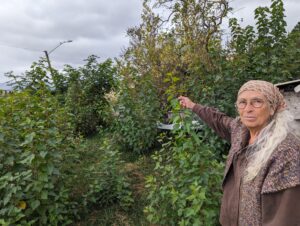
Miriam Kent points to a spot in her yard where a large tree once stood. (Credit: Lauren Paterson / NWPB)
They formed a cooperative. The group is pushing for better communication from the owners of the parks, and the chance to buy out the park if the owner ever tries to sell it. Residents could then own and manage parks themselves.
“I loved going to the meetings,” said Kent. “This is the first time I felt like I’ve been part of a grassroots thing from the absolute get-go.”
One of the people who helped organize those meetings was Leontina Hormel, the woman who wrote “Trailer Park America: Reimagining Working Class Communities.”
“Those housing opportunities in these traditionally marginalized spaces have become places where more and more people of the working class seek living because it is the only affordable housing opportunity for them,” said Hormel.
One of the solutions to the challenge of housing in Latah County is the idea of a housing authority. “This is a separate governing body that can work on building affordable housing,” said Kathie LaFortune, a Latah County Commission for District 1.
“Living in the state of Idaho, they have little in the way of rights, and there is little we as a county can do legislatively,” she said.
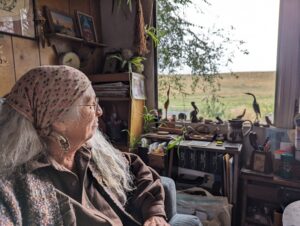
Miriam Kent looks out the window of her trailer house towards a large golden field in the Appaloosa Community mobile home park. She said she’s proud of a grassroots movement to organize the residents of Hurst & Sons owned parks. (Credit: Lauren Paterson / NWPB)
While residents wait to see what local politicians can do, they are getting legal help from the Intermountain Fair Housing Council.
There aren’t any lawsuits yet, but “There’s been grounds, potentially, for some lawsuits,” said Monica Fabbi, an attorney at the organization.
Using the Fair Housing Act, Fabbi said her job is to eradicate discrimination. The Act bans discrimination in housing accommodations based on race, religion, sex, marital status, nationality, ancestry or disability. It also protects people from discrimination when they are renting or buying a home, getting a mortgage or seeking housing assistance.
“We will defend as many residents who receive an eviction notice as we can,” said Fabbi. “And we will try to get free eviction defense for the ones we cannot defend.”
Right now, the organization is working on filing Housing and Urban Development (HUD) complaints on behalf of the residents of parks in Latah and Nez Perce counties owned by Hurst & Sons LLC.
After a complaint is filed, HUD has a process to determine if the allegations are true. The next step might be an investigation.
If HUD believes a discrimination has occurred, the agency refers it to an administrative legal judge or the Department of Justice, said Fabbi.
“If the Department of Justice takes it, your client has won because the Department of Justice does not like to lose,” said Fabbi.
Many Latah County mobile home park residents are veterans, retirees, young students or living on disability. They are also neighbors and friends who are losing their community and sense of belonging, said Hormel.
Many mobile home communities in the United States were built in the 1960s back when America wanted to help working class people, said Hormel.
“Each time we see a tenement building get evacuated and condemned, each time we see a mobile home community get closed down, so that it can be stripped of its residents and turned into something else, we are basically dispossessing people of their right to a dignified life,” said Hormel.

Leontina Hormel is a sociology professor at the University of Idaho. (Credit: University of Idaho)
The lack of affordable housing in the U.S. for working class families is a form of slow violence that people are now experiencing at the national level, said Hormel.
“People’s wages have not kept up with the rate of inflation,” said Hormel, who teaches classes on social theory and globalization. Costs for childcare have soared and are now “untenable for families” even in lower cost areas, according to the Department of Labor.
Healthcare is most often connected to employment in the United States, and costs of insurance and medication have skyrocketed. All of these challenges for working class people mean less money for housing, which is increasingly out of reach for all Americans, no matter how hard you work, said Hormel. That’s one of the themes she explores in her new book.
“These mobile home communities, what they’re going through, I think, offer us an immediate and direct view of what it looks like for people on the ground,” said Hormel.
This story isn’t just about mobile home parks, said Hormel. “I’m talking about working class communities.”
“Trailer Park America” will be released November 10. All royalties earned from the book will be donated to Sojourners Alliance of Moscow, a non-profit organization dedicated to helping people facing hunger and barriers to housing.
A presentation by Hormel on her book “Trailer Park America” will be held on Tuesday, November 14 from 6 p.m. to 8 p.m. in the Great Room of the 1912 Center in Moscow, Idaho. Local bookstore, BookPeople, will be selling copies of the book at the event.
Hurst & Sons LLC did not respond to an email request for comment.

